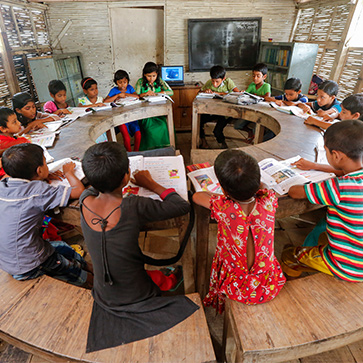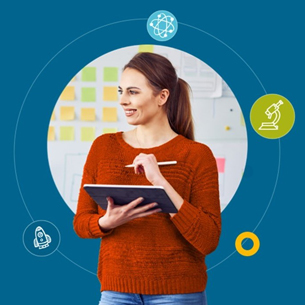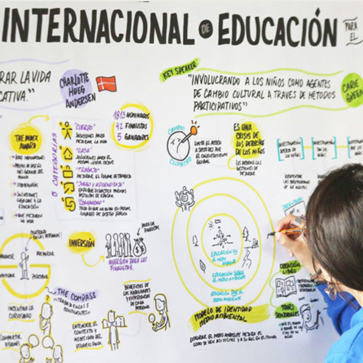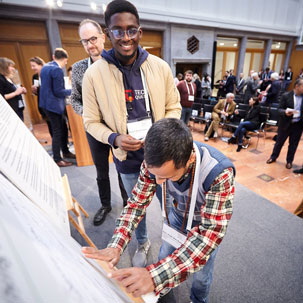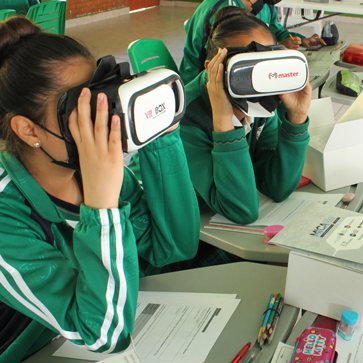STEM + Climate Learning to act: climate change education in sustainable development
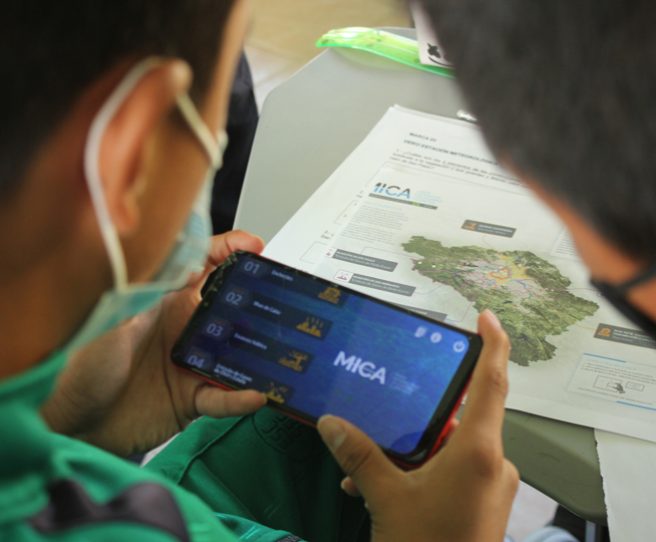
Millions of young people around the world have mobilized around climate issues. Shared emotions and a common understanding of factual realities are motivating factors, but they are mostly driven by a pressing desire to take action. Climate change education is more important now than ever: understanding the causes and effects of climate change is the first step in shifting mindsets, establishing new ways of limiting its impact, and adapting to its unavoidable effects. With high-quality teaching materials, innovative methods, and a network of relevant stakeholders, our aim is to create conditions for more and improved climate change education in schools to bring about urgent environmental, societal, and economic transformation.
Situation
Education is a climate issue
We are all aware that our carbon emissions need to sink to zero by 2050 at the latest to stop climate change. To achieve this goal, we must radically change our lives and economies. However, as explained in a study called “Social tipping dynamics for stabilizing Earth’s climate by 2050” by the Potsdam Institute for Climate Impact Research, “sustainability cannot be imposed, it has to be learned.” For the study, an interdisciplinary team of researchers examined potential “tipping interventions” that could bring about the changes needed to slow climate change. Education is one of the six interventions: it is crucial to first understand the causes and effects of climate change before considering new ways of preventing it. The UN’s Sustainable Development Goals and UNESCO’s Global Education Monitoring Report 2020 inform this understanding of the role of education in addressing climate change.
»We need to change the way individuals think and act to ‘change minds, not the climate’.«
UNESCO: Why we urgently need to teach and learn about climate change, 2019
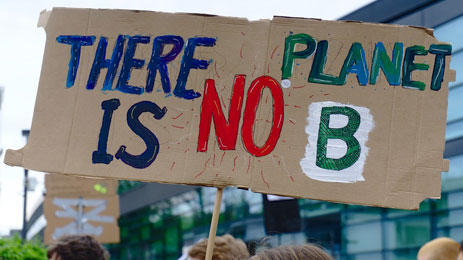
Our Climate Change Media Packages
- Part I: Understanding Global Warming
- Part II: Impacts of Climate Change
- Part III & IV to follow
Motivation
Getting society on the same page
Siemens Stiftung is motivated by the belief that education can bring about fundamental changes in a society. Our efforts within the foundation and as a leader in various networks provide teacher training on climate change education, create teaching materials, organize workshops and academic discussions, and contribute to regional, national, and international committee work.
Anchoring climate change in the curriculum
Climate change and climate change education are global challenges that must be addressed through a combination of local learning and action in addition to wider systematic mindset shifts. For us, quality climate change education explores and disseminates knowledge about the climate, climate protection measures, and support for individual and societal climate resilience. We believe climate change education should be firmly embedded in national education agendas, a concept supported by the United Nations Sustainable Development Goals 4.7 (education for sustainable development) and 13.3 (education for climate protection and climate adaptation).
Unlocking sustainable change with STEM knowledge
Our work focuses on STEM subjects (science, technology, engineering, and mathematics). These subjects are critical for a fundamental shift toward sustainable development, which must be built from the ground up. Children equipped with a basic education built upon digital competencies and a solid understanding of science and technology gain the ability to grasp complex concepts. Carrying this knowledge into adulthood correlates with more opportunities to act on local and global issues and to responsibly engage in societal processes.
Pursuing an active role as a climate protection stakeholder
In our view, climate change education is always multidisciplinary: in addition to serving as a climate protection strategy, it is also a strategy for promoting sustainable climate adaptation across entire social systems. Beyond shaping political and economic action, knowledge of climate change helps mindful citizens serve as important climate change advocates while strengthening climate resilience at the local and global level. The transformation process must include all stakeholders equally: if every person is willing to make systemic, strategic, consumer behavior, and lifestyle changes based on the principles of sustainable development, we can reach the goals we set out to achieve together.
PHINEO awards the impact our projects
The non-profit organization PHINEO has acknowledged our international commitment to climate change education and awarded it the “Wirkt-Siegel” (“Impact Seal”) in recognition of its exceptional effectiveness.
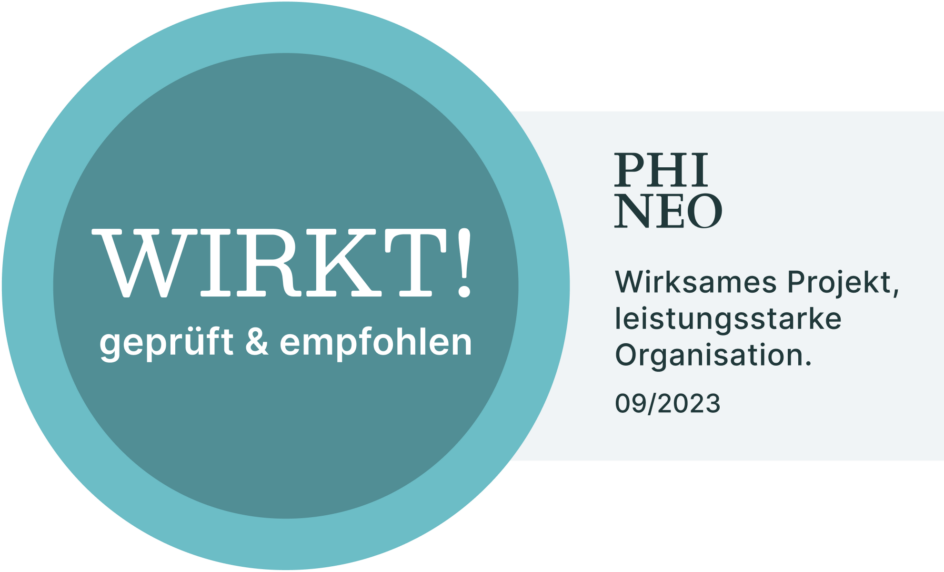
Engagement
Advancing innovative climate change education around the world
With numerous projects and collaborations, we are committed to high-quality climate change education in the classroom. One of our special concerns is to connect partners at all levels, to give impulses and to build bridges – locally, regionally and internationally.
Regional and international network for climate change education
The scope and interconnectedness of climate change and climate change education are so large that no single country, group, or individual can face them alone. Finding solutions to these challenges requires cross-border efforts involving all social groups. We initiate regional and international networks and conferences to ensure climate change education is a priority beyond the classroom, anchoring the concept in education agendas and connecting stakeholders.
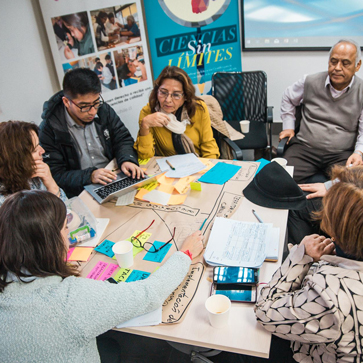
Teaching and learning materials and continuing education on climate protection
Together with our partners, we have created quality teaching and learning materials to support lessons on climate change. These materials combine creative educational approaches and scientific findings with innovative methods, helping teachers and students explore the complex system of climate change and act upon local and global challenges.
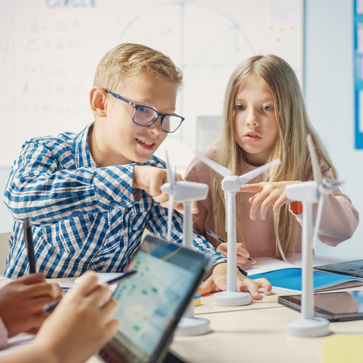
Projects
Office for Climate Education
As a member of the Office for Climate Education (OCE) we work with international foundations, NGOs, and research institutes on teaching materials for climate education that are free of charge and accessible anywhere. The OCE materials take the findings of a report from the Intergovernmental Panel on Climate Change (IPCC) and divide them into compact, easy-to-understand lessons. The materials – available in English, German, French, and Spanish – are supplemented by continuing education opportunities for teachers and conferences that are held in developing and emerging nations. The Office for Climate Education operates under the auspices of UNESCO.
Siemens Stiftung's Media Portal
A number of teaching materials for climate change education are available as free downloads on our Media Portal which includes content from our international education program Experimento. The worksheets, videos, and interactive graphics are available in English and German and have been adapted to national curricula in several countries. The materials are available as Open Educational Resources (OER), meaning they can be modified and supplemented with additional or original materials by educators. The Media Portal also includes methodology guidelines on how to implement the materials in the classroom.
CREA: El Portal de Medios para la Enseñanza STEM
In Latin America, we operate the Spanish-language educational portal CREA (Centro de Recursos Educativos Abiertos), which currently hosts approximately 1,800 resources for STEM education. On CREA, we bundle our open Spanish-language teaching materials with those of our partner institutions from the Red STEM Latinoamérica network. Teachers can also find numerous resources for climate change education on this platform.
CIECC: International Conference on climate change education
Together with the Center for Climate and Resilience Research (CR²) at Universidad de Chile, we organize an annual international conference on climate change education for Latin America called “Conferencia Internacional en Educación en Cambio Climático” (CIECC). In discussions and panels, education experts share their experiences and expectations of climate change education while building networks and offering guidance on certification and continuing education. The attendees are united by the belief that climate change education is worthy of permanent inclusion in curricula around the world. The Office for Climate Education is among the organizers of the event.
International Dialogue on STEM Education
Together with the Stiftung Kleine Forscher (Little Scientists Foundation), we manage an international peer network called the “International Dialogue on STEM Education” (IDOS). Sustainable development education and climate change education play a central role in the network’s activities. Connecting more than 120 education experts from some 40 countries, the network includes stakeholders who are working together to build an ecosystem for education innovation and sustainable change. In 2019, the group published a position paper, “Using Science to Do Social Good: STEM Education for Sustainable Development”, which outlined the importance of STEM education in sustainable development.
Climate change education in Red STEM Latinoamérica
Red STEM Latinoamérica is a Siemens Stiftung STEM network connecting more than 90 education stakeholders in 13 Latin American countries to address STEM education for sustainable development and climate change education. Local stakeholders work on context-specific education concepts for selected regions as part of STEAM Territories, while Red STEM’s Spanish-language education portal CREA (Centro de Recursos Educativos Abiertos) gathers a wide range of didactic materials from all its partner organizations. The STEM Education for Innovation initiative continuously provides new and additional innovative teaching materials for climate change education. These range from new blended learning formats to interactive climate change maps and virtual classrooms.
Global Views on Climate Change Education
In our “Courage & Innovation” podcast, Dr. Claudia Uribe (UNESCO) and Dr. Nina Smidt (Siemens Stiftung) discuss how international collaboration can improve climate change education.
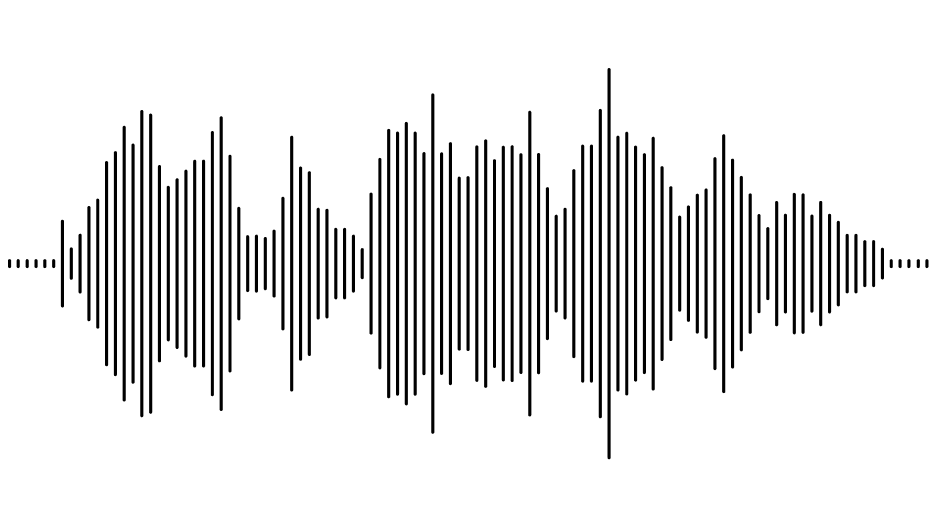
Learning from each other
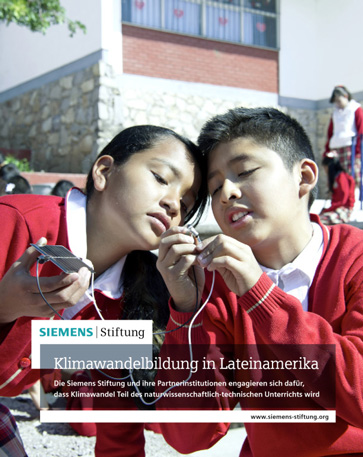
Climate Change Education in Lateinamerika
The “Climate Change Education in Latin America” brochure is a compilation of best-practice approaches and positions on climate change education. It is designed to encourage education stakeholders around the world to include climate change education in their national education agendas.
Would you like to join us in advancing climate change education around the world? We look forward to hearing from you!
Project manager STEM & Climate / International Networks
Badin Borde
badin.borde@siemens-stiftung.org
Director of Latin America Regional Office
Ulrike Wahl Haber
ulrike.wahl@siemens-stiftung.org
Links
Would you like to learn more?
Websites
Interviews
- "Learning to act: STEAM education for sustainable development": Projektbeispiel aus Chile Lateinamerika
- Video interview with Dr. Nina Smidt and Dr. Claudia Uribe on climate change education
- “Local stakeholders - internationally networked” – Interview with Badin Borde
- Keynote from Dr. Nina Smidt at CIE
Downloads
Teaching materials
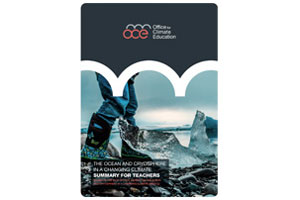
A summary for teachers of the IPCC special report The Ocean and Cryosphere in a Changing Climate contains inspiration for lessons, a glossary, and useful links.
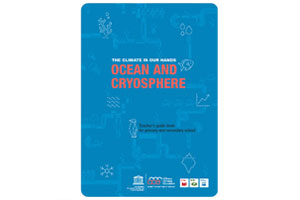
The climate in our hands – Ocean and Cryosphere contains a lesson plan for teachers for addressing climate change in in grades 5-10. It covers subjects such as oceans and glaciers.
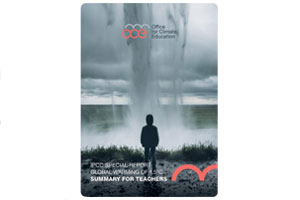
A brochure with a summary for teachers of the most important findings of the IPCC special report Global Warming of 1,5°C. It includes complimentary lesson activities.
Background material
- Active Philanthropy (2020): Funding the Future. How the climate crisis intersects with your giving
- Borde, B., Filtzinger, B., Wahl, U. (2020): Leveraging the power of education In: Siemens Stiftung: Climate Change Education in Latin America
- Borde, B., Léna, P., Lescarmontier, L. (2021): Education as a Strategy for Climate Change Mitigation and Adaptation. In: Lackner, M., Sajjadi, B., Chen, WY.: Handbook of Climate Change Mitigation and Adaptation
- Goldwaldt, T. & Karsgaard, C.: Center for Global Education. Annual Report (2018)
- Intergovernmental Panel of Climate Change: Global warming of 1.5°C (2019)
- Martens, J. & Obenland. W.: Die Agenda 2030. Globale Zukunftsziele für nachhaltige Entwicklung (2017)
- Otto, I. M. et.al.: Social tipping dynamics for stabilizing Earth’s climate by 2050. In: Proceedings of the National Academy of Sciences (2020)
- UNESCO: Education for sustainable development: a roadmap (2020)
- UNESCO: Global Education Monitoring Report 2020 - Inclusion and education: All means all (2020)
- UNESCO: Why we urgently need to teach and learn about climate change (2019)



